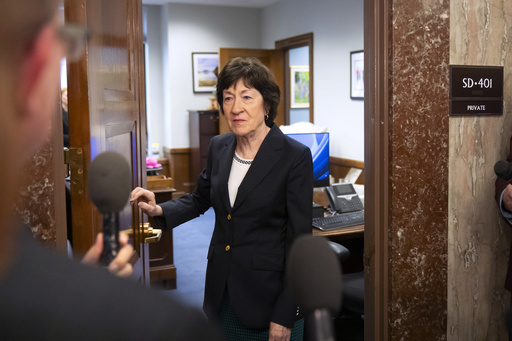
WASHINGTON — The confirmation process for President-elect Donald Trump’s Cabinet remains uncertain, as Republican senators have carefully navigated sensitive issues concerning nominees throughout December. These issues include Robert F. Kennedy Jr.’s controversial stance on vaccines, allegations of sexual misconduct against Pete Hegseth, and Tulsi Gabbard’s previous engagement with former Syrian President Bashar Assad in 2017.
Some GOP senators have openly expressed their support for Trump’s choices, while others are holding back, particularly regarding his more contentious nominees. This inconsistency introduces a level of unpredictability as Republicans are poised to assume a narrow Senate majority in January, just as Trump urges swift confirmation of his Cabinet.
Traditionally, it is common for senators to postpone their public endorsements or rejections of nominees until after confirmation hearings. However, the current situation is more complicated, as Trump and his supporters have made clear they intend to challenge any Republican senator deviating from party loyalty.
Donald Trump Jr. recently issued a stark warning, implying that Republican control of the Senate is largely due to his father’s influence, suggesting that without Trump, the party would lose its significant role in politics.
So far, the process has resulted in a notable withdrawal: Matt Gaetz, a former representative from Florida, stepped back from consideration for attorney general following senators’ private reservations about him. Nonetheless, Trump has maintained his backing for other nominees, including Kennedy for the Department of Health and Human Services, Hegseth for Defense, and Gabbard for director of national intelligence.
With confirmation hearings expected to commence by mid-January, just prior to Trump’s inauguration, senators will soon face the challenge of evaluating the nominees and determining whether they will oppose any of them. Republicans hold a slim 53-47 majority, meaning Trump can only afford to lose three votes if Democrats stand united against his nominees.
The success of these confirmations, along with the degree of dissent observed in the Senate, is anticipated to set the tone for Trump’s presidency and his interactions with Congress, which often descended into conflict during his previous term. Although tensions with the Senate were frequent, Trump is signaling a desire for increased compliance from Republican senators this time around.
Oklahoma Senator Markwayne Mullin, who is closely aligned with Trump, expressed that the focus should be on “keeping nos off the board” rather than merely accumulating votes for confirmation.
While a majority of Republican senators have sought to demonstrate loyalty to Trump, a few have signaled they are prepared to uphold the Senate’s responsibility for “advise and consent.” Notable senators who will be under scrutiny include moderates Lisa Murkowski of Alaska, Susan Collins of Maine, and new senator John Curtis of Utah.
Curtis recently declared on a news program that he welcomes scrutiny for fulfilling his constitutional duties in assessing Trump’s nominees, asserting that he takes this responsibility seriously.
Despite their roles as moderate voices, these senators have yet to openly criticize the nominees, and no Republican senator has officially voiced opposition to any appointment thus far.
Certain nominees are anticipated to receive near-unanimous support for confirmation, possibly bolstered by some Democratic votes. For example, Senator John Fetterman from Pennsylvania has signaled his willingness to back Florida Senator Marco Rubio as secretary of State, along with Rep. Elise Stefanik for United Nations ambassador, with additional Democratic support expected.
However, unity in the Republican Party will be crucial for confirming the more contentious nominees.
Hegseth, a Fox News host and veteran, has attracted controversy for his perceived lack of experience and public comments questioning women’s roles in combat. He has faced allegations of sexual misconduct and heavy drinking, which he denies, leading to some hesitance among senators despite Trump’s clear endorsement.
Iowa Senator Joni Ernst, a combat veteran committed to addressing sexual assault issues within the military, has engaged with Hegseth multiple times yet has not committed to supporting him. She will have the opportunity to question him during a Senate Armed Services Committee confirmation hearing set for January 14.
Although Gabbard’s hearing date remains unset, senators are expected to have the chance to interrogate her regarding her visit to Syria when the U.S. had cut diplomatic ties. Gabbard defends her trip as a necessary step toward dialogue, yet her remarks have drawn parallels to narratives favored by Russian interests. As opposition forces in Syria recently threatened Assad’s power, this adds to the scrutiny surrounding Gabbard.
While most Senate Republicans have hesitated to openly criticize Gabbard’s overseas relations, nearly 100 former senior U.S. officials have called for closed-door hearings to allow for a thorough examination of her record.
Skepticism has surfaced regarding Kennedy, particularly due to his long-standing critique of certain vaccines. Following a report detailing a petition by one of his advisers to revoke the polio vaccine’s approval, Senate Republican leader Mitch McConnell issued a statement emphasizing the danger posed by efforts that could erode public trust in proven vaccines. McConnell, who has a personal history with polio, will leave his leadership role next year but will continue to influence Senate votes.
Many senators are adopting an advisory approach, guiding nominees on how to secure their confirmations. North Carolina Senator Thom Tillis mentioned he encourages nominees to engage with the press, addressing any concerns head-on.
These confirmation proceedings are unfolding amid heightened stakes for both the incoming administration and the Senate, as party loyalty and the handling of contentious issues may shape the future landscape of governance.

